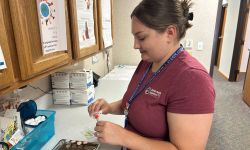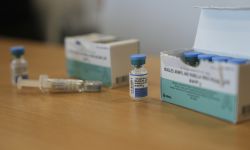For COVID long-haulers, trouble lingers long after 'recovery'

Gloria Vettese of Warren is haunted by the terror she felt in late March and early April, when she lay awake night after night, waiting and wondering whether COVID-19 would kill her and make her only child an orphan.
She managed to survive the virus, and is now among the nearly 200,000 Michiganders considered recovered so far in the coronavirus pandemic.
But the only criteria to be included in the state's recovery statistics is to be alive 30 days after symptoms began. It doesn't mean life is back to the way it was before the virus struck.
For 56-year-old Vettese and a growing number of other survivors, nothing about life post-COVID is normal.
Stories from the front
Bridge Magazine, Detroit Free Press and Michigan Radio are teaming up to report on Michigan hospitals during the coronavirus pandemic. We will be sharing accounts of the challenges doctors, nurses and other hospital personnel face as they work to treat patients and save lives. If you work in a Michigan hospital, we would love to hear from you. You can contact reporters Robin Erb rerb@bridgemi.com at Bridge, Kristen Jordan Shamus kshamus@freepress.com at the Free Press and Kate Wells katwells@umich.edu at Michigan Radio.
They're what's come to be known as long-haulers in a pandemic that's killing about 2,500 Americans a day as case numbers soar from coast to coast.
Those who survive COVID-19 are often left with puzzling and sometimes debilitating conditions months after they are considered recovered from the infectious part of the disease.
Research now suggests that although SARS-CoV-2 is a respiratory virus, it can cause inflammation and changes to the vascular system that can injure blood vessels and lead to blood clots and organ damage.
To long-haulers like Vettese, the story of this pandemic isn't only about who lives and who dies. It's also about the people whose recoveries are slow and uncertain, who wonder if what they're feeling in this moment will be as good as it gets for as long as they live.
"I have friends and close family members who are anti-maskers and who go to five bars a night, and are pretty much, you know, just, 'I need to live my life' " Vettese said. "I feel disrespected by that and I feel hurt by that. When the people who know you ... don't take it seriously, it makes it like, OK, do you think I'm making it up?”
When coronavirus knocked down Vettese, she wasn't sure she'd get through it. "It was just 10 days of living hell," she said.
"I couldn't take a whole breath in, and so I would force myself to breathe." She knew she probably should have gone to the hospital, but Vettese said if she did, there would have been no one to care for Aaron, her 13-year-old son.
She had a debilitating headache, fever, and body pain. Her appetite disappeared. Her vision had gone fuzzy, too.
- The latest: Michigan coronavirus unemployment, map, curve, updated COVID-19 news
- Dashboard: Michigan coronavirus testing numbers, trends, COVID-19 data
"I would just sit here and I would be thinking, 'My brain is gonna blow. I'm going to have an aneurysm. I'm going to have stroke. I'm going to have an embolism," she said. "I was worried about blood clots because I couldn't move. ... At that point, I almost didn't even care if I died because it just hurt, and ... you just feel so bad that it just didn't matter.' "
But when Easter Sunday dawned, Vettese said the headache vanished. An incessant ringing in Vettese's ears replaced the headache, and that still hasn't gone away.
Now, she leaves the television on low most of the time "to try to muffle the sounds in my head," she said. "If I'm sitting in complete quiet, it dominates."
She's working toward a bachelor's degree, but said the brain fog and cognitive changes are so pronounced, it's been hard to get the straight-As she used to have.
"Timed online tests and quizzes aren't new to me and I'm not a slow learner and I'm not a slow test taker," Vettese said. But post-COVID, "I couldn't finish my work. I couldn't finish my quizzes.
"I've described it as like almost feeling kind of like a bubble around your head, like something that needs to pop so you can get connected with reality."
She has PTSD, too, reliving what it felt like when the virus had her in its grips.
"I would lay down at night and I would feel like ... it's going to get me because I'm going to let my guard down and close my eyes and go to sleep, and it's going to come and kill me in my sleep," Vettese said.
New research published in November in the Annals of Internal Medicine provides evidence that COVID-19 does have a long-term impact for some people.
"It was sobering" to see the outcome of the study of 1,648 patients treated at 38 Michigan hospitals from March to early July, said Dr. Vineet Chopra, who led the research.
Of them, 25% died while hospitalized. Another 7% died within two months of being discharged and 15% had to be readmitted to a hospital for ongoing health problems.
Among the 488 survivors who participated in the follow-up surveys in the MI-COVID19 Initiative registry two months after they were discharged, the number who said they were back to normal and free of lingering health effects was "vanishingly small," said Chopra, who is chief of hospital medicine at Michigan Medicine at the University of Michigan.
Thirty-nine percent reported persistent health problems that kept them from doing normal activities and 12% said they couldn't even do basic things to care for themselves.
"I think the part that really affected me the most was just the whole devastation post COVID, which was around not being able to get back to work, for example, because of physical ailments, not being able to really do the things they needed to do for their daily living, like breathing and going to the bathroom and cleaning up the house and going grocery shopping because of persistent weakness, irritability or fatigue overall," Chopra said.
See what new members are saying about why they donated to Bridge Michigan:
- “In order for this information to be accurate and unbiased it must be underwritten by its readers, not by special interests.” - Larry S.
- “Not many other media sources report on the topics Bridge does.” - Susan B.
- “Your journalism is outstanding and rare these days.” - Mark S.
If you want to ensure the future of nonpartisan, nonprofit Michigan journalism, please become a member today. You, too, will be asked why you donated and maybe we'll feature your quote next time!








